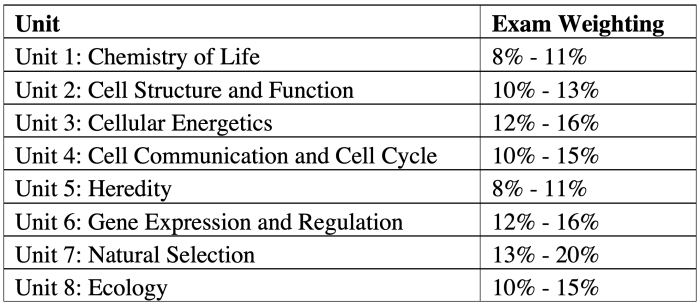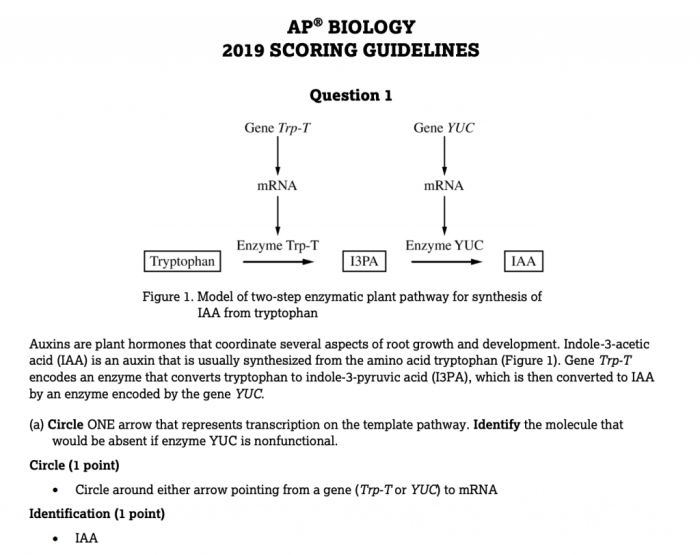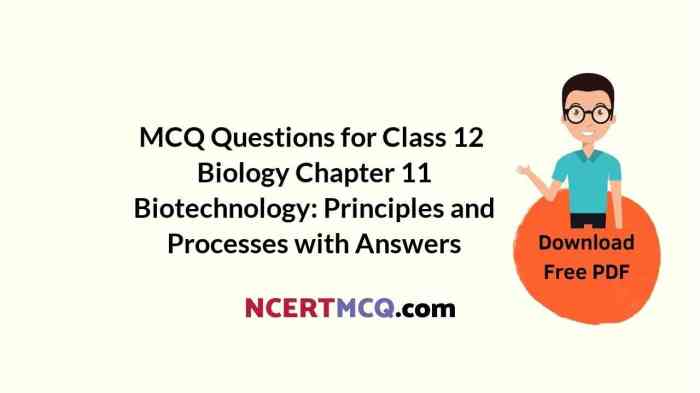Welcome to the ultimate guide to AP Bio Unit 6 MCQ practice! Here, we’ll dive deep into the world of multiple-choice questions, providing you with essential tips, strategies, and resources to ace your exam.
Mastering MCQs is crucial for excelling in AP Biology Unit 6. They test your understanding of complex concepts, challenge your critical thinking skills, and help you identify areas for improvement.
MCQ Practice for AP Biology Unit 6

Mastering the content of AP Biology Unit 6 is crucial for exam success. One effective way to prepare is through diligent practice with multiple-choice questions (MCQs). Engaging with MCQs offers a myriad of benefits that enhance your understanding and readiness for the exam.
Effective MCQ Practice
To maximize the benefits of MCQ practice, consider the following strategies:
- Time yourself:Simulate exam conditions by setting a timer for each practice session. This helps you develop time management skills and identify areas where you need to improve your pace.
- Review explanations:Don’t just check the answers; take the time to understand why each option is correct or incorrect. This reinforces your understanding and helps you avoid similar mistakes in the future.
- Identify patterns:Pay attention to recurring concepts and question types. This can help you anticipate the types of questions you may encounter on the actual exam.
Types of MCQ Questions

In AP Biology Unit 6, you will encounter various types of multiple-choice questions (MCQs) that test your understanding of the concepts and principles of genetics and evolution.
These questions are designed to assess your ability to analyze, interpret, and apply your knowledge in different contexts. To succeed in answering these questions, you need to possess a range of cognitive skills, including:
- Knowledge and understanding of genetic principles and evolutionary theories
- Critical thinking and problem-solving skills
- Ability to interpret data and draw conclusions
li>Ability to apply concepts to novel situations
The following table summarizes the different types of MCQ questions you may encounter and their characteristics:
| Question Type | Cognitive Skills | Characteristics |
|---|---|---|
| Knowledge-based questions | Recall of facts and concepts | – Ask for specific information or definitions
|
| Comprehension-based questions | Understanding of concepts and relationships | – Ask for explanations or interpretations of concepts
|
| Application-based questions | Ability to apply knowledge to new situations | – Present a novel scenario or problem
|
| Analysis-based questions | Ability to break down and examine information | – Present complex data or information
|
| Evaluation-based questions | Ability to make judgments and draw conclusions | – Ask for opinions or justifications
|
Content Coverage

AP Biology Unit 6 delves into the fascinating world of genetic variation, inheritance, and the molecular basis of evolution. Understanding these concepts is crucial for comprehending the diversity of life and the mechanisms that drive evolutionary change.
Working through the AP Bio Unit 6 MCQs can be a great way to solidify your understanding of the material. And if you’re wondering how many significant figures are in 400, you can find a helpful explanation at how many sig figs in 400 . Armed with this knowledge, you’ll be well-equipped to tackle the rest of your AP Bio Unit 6 MCQs with confidence.
To effectively assess students’ understanding of these concepts, a practice MCQ set should comprehensively cover the following key topics:
Patterns of Inheritance
- Mendel’s laws of inheritance, including dominance, segregation, and independent assortment
- Extensions of Mendelian genetics, such as incomplete dominance, codominance, and multiple alleles
- Pedigree analysis and Punnett squares for predicting inheritance patterns
Molecular Basis of Inheritance
- The structure and function of DNA and RNA
- DNA replication, transcription, and translation
- Gene regulation, including operons and epigenetic modifications
Genetic Variation
- Sources of genetic variation, such as mutations, recombination, and gene flow
- Types of mutations and their effects on gene function
- Genetic drift, natural selection, and the Hardy-Weinberg equilibrium
Evolution, Ap bio unit 6 mcq practice
- Mechanisms of evolution, including natural selection, genetic drift, and gene flow
- Evidence for evolution, such as fossil records, comparative anatomy, and molecular data
- The role of evolution in shaping the diversity of life
Time Management and Strategy

Effective time management is crucial for completing MCQs within the exam time limit. Prioritizing questions and pacing oneself can help maximize efficiency and accuracy.
Identifying High-Yield Topics
Familiarize yourself with the AP Biology curriculum and identify high-yield topics that are frequently tested. Focus your preparation on these areas to increase your chances of success.
Prioritizing Questions
During the exam, quickly scan the questions and identify those you are confident in answering. Start with these questions to build momentum and save time for more challenging ones.
Pacing Oneself
Allocate a specific amount of time to each question. Stick to this schedule to avoid spending too much time on difficult questions. If you get stuck, move on to the next question and return to it later if time permits.
Common Mistakes and Pitfalls: Ap Bio Unit 6 Mcq Practice

Mistakes in AP Biology Unit 6 MCQs often arise from misconceptions, carelessness, or lack of preparation. To improve accuracy, it’s crucial to identify and address these common pitfalls.
One major issue is confusing similar terms or concepts. For example, students may struggle to differentiate between homologous and analogous structures, or between active and passive transport. Thorough understanding of key concepts is essential to avoid such errors.
Misconceptions and Corrections
- Misconception:Evolution is a linear process. Correction:Evolution is a branching process, resulting in a diversity of species with shared ancestry.
- Misconception:Natural selection acts on individuals. Correction:Natural selection acts on populations, not individuals, favoring traits that enhance survival and reproduction.
- Misconception:Genetic variation is only caused by mutations. Correction:Genetic variation can also arise from gene flow, genetic drift, and recombination.
FAQ Compilation
What are the benefits of practicing MCQs?
MCQ practice helps improve comprehension, identify knowledge gaps, enhance critical thinking, and boost confidence.
How do I effectively use MCQ practice materials?
Review concepts thoroughly, time yourself to improve pacing, analyze incorrect answers to learn from mistakes, and seek clarification when needed.
What types of MCQ questions can I expect?
MCQ questions can range from simple recall to complex analysis, testing your understanding of concepts, theories, and experimental data.